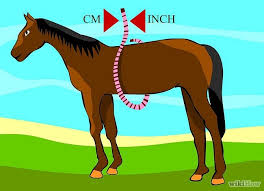No, this is not an article about how to shed those winter pounds before spring break. Despite hours of working out and dieting, it seems that some of us humans are meant to keep a nice winter layer of fat. That probably was great for our ancestors who worked outside, did physical labor, and risked running out of food during the winter. It is not so great for our sedentary, modern warm life today – but I digress.
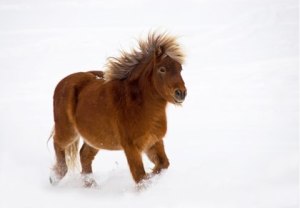
Source: thehorse.com
Like the humans of times long ago, horses that can pack on weight before winter generally fare better than their skinnier counterparts. The fat keeps them insulated and can be converted to glucose for energy (and thus heat production) when food is not available. Well-muscled horses also do better than thin ones in the winter, so please don’t think I am just advocating horse obesity. But, the point I am trying to make is that winter is hard on horses – especially the thin ones and old ones.
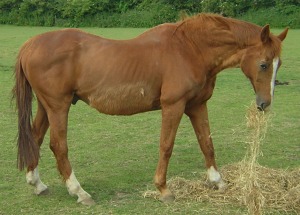
Source: gravenhorse.co.uk
What makes winter so difficult for horses?
The number one issue I see for horses in winter is colic, mostly due to dehydration. In a previous post (Making Horses Drink), I have discussed how to encourage your horse to drink when it is cold outside, so I am not going to go over that now. But, I do want to mention that the horses may not feel the need to drink when they are not sweating or active like they are in summer. So this is one way that winter can be hard on a horse.
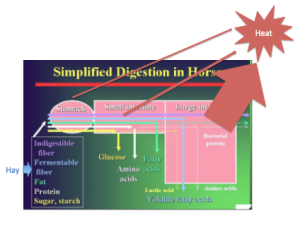
Modified from: equisearch.com
Another major problem is the cold. Horses use several tricks to keep themselves warm in the frigid temps. One way they stay warm is by growing extra hair (a “winter coat”) which can trap air near the body and create insulation. Another method is metabolism. Horses that eat hay generate lots of internal heat as they metabolize their meal. Digestion of grain does not generate much heat in this aspect because it is digested much faster and easier than hay. Hay undergoes fermentation in the cecum and colon, which serves as an excellent internal heater.
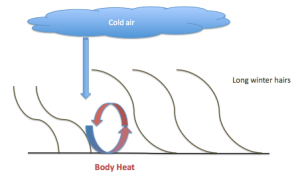
The methods horses naturally use to stay warm in the winter can fail though. If their coat gets damp they can become chilled. Left outside without hay to munch on can also lead to problems. Once a horse gets cold, a downhill cascade may begin with the ending being a down horse (see post on “The Dreaded Down Horse” for more details). Finally, ice and snow can cause footing to be hazardous. Last week I had to put a horse to sleep that had completely fractured its upper femur when it slipped on the ice and snow :(.
Why do horses lose weight in the winter?
Like discussed above, metabolism is a very important way that horses stay warm when the temperature drops. Metabolism refers to the production of energy from the digestion of feed. To create more heat, metabolism is increased, which means food is digested and used up at a higher rate than normal. Think of digestion like a fire. When you add wood (i.e. food) to the fire, the fire generates more heat. As the fire generates more heat, it takes more wood to continue to keep the fire at the appropriate level. Simply put, horses generate heat by increasing their metabolism, which means that they require more calories in cold weather than in warm weather.
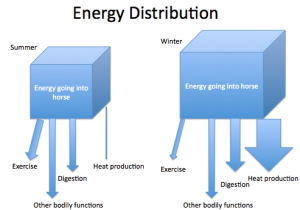
Because their metabolism is ramped up, unless their caloric intake is increased your horse will be burning more calories than he is eating. This situation leads to weight loss. Other things that may also contribute to weight loss include poor dentition, competition for food, and lack of mobility. If a horse has dental abnormalities they may not grind their food to the appropriate size for maximum digestion. Furthermore, hay is harder to chew than nice soft moist grass, so they may not eat as much forage as they do during the growing season. If a horse is in a herd situation they may find themselves competing to get to the hay pile or feeder, whereas when grass is available in the pasture everyone can spread out and eat at their leisure. Finally, horses that are arthritic find moving more difficult when the weather is cold. They may choose to stay put rather than walk over to the food in order to avoid the pain associated with arthritis.
How can winter weight loss be prevented?
1. Regular examination – Examine your horse carefully regularly. Brush him and feel over his ribs and hip bones. You should be able to feel his ribs at the widest part of his barrel and the hip bones should not be prominent. If you start to feel his spine protrude, then he is very underweight. Better yet, get a weight tape and take a weekly weight. This will give you a nice set of data that you can compare and review to look for trends in weight gain or loss. And please, if you blanket your horse – take off the blanket and look at the horse regularly!
2. 24/7 Hay – Keep hay available to your horse 24/7 in the winter. It does not have to be the richest hay, but it should be palatable and soft if possible.
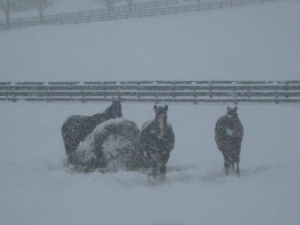
3. Dental check-up in the fall – Have your veterinarian do a comprehensive dental examination every fall before your horse starts to lose weight. Your horse may need some dental work before the winter season hits.
4. Increase the caloric intake of geriatric horses – Geriatric horses have a particularly hard time in the winter and tend to lose weight more easily than their younger counterparts. Under the direction of your vet or horse nutritionist, gradually increase the grain and/or feed your older horse receives on a daily basis. They may recommend certain supplements or additives to increase his caloric intake without having to add a lot of bulk. One recommendation I give is to begin adding a 1/4 cup of corn oil to the feed. However, please call your vet and discuss diet changes before adding anything to the feed!
How can I help my horse gain weight?
If you have noticed that your horse is looking too thin the first step is to weight-tape him. Write down what he weighs and the date. Then you should call your vet or equine nutritionist to formulate an ideal diet catered to your horse. Some commonly used supplements/feed that can assist in adding weight to your horse are as follows.
1. High-quality hay
2. Beet pulp
3. Senior feed
4. Corn oil
Again, please call your vet to discuss ANY diet changes you plan on making for your horse. There may be an underlying condition present in your horse that could worsen with specific dietery changes. For instance, if you have an HYPP positive horse you do not want to give them a bunch of alfalfa hay because the high levels of potassium in the hay could exacerbate his condition and lead to a “tying-up” episode.
